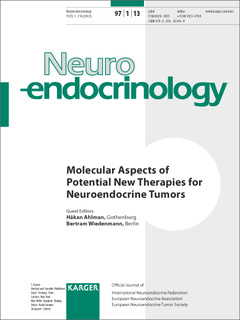Description
Molecular Aspects of Potential New Therapies for Neuroendocrine Tumors
Special Topic Issue: Neuroendocrinology 2013, Vol. 97, No. 1
Language: English
Subjects for Molecular Aspects of Potential New Therapies for...:
Keywords
Publication date: 02-2013
114 p. · Paperback
114 p. · Paperback
Description
/li>
Neuroendocrine tumors (NETs) are characterized by both chemoresistance and long-term survival even in metastatic disease. NETs secrete biogenic amines and/or peptide hormones causing hormonal symptoms. They express a variety of peptide receptors, receptor tyrosine kinases relevant for tumor growth and angiogenesis, and intracellular targets of importance for tumor growth and apoptosis, e.g. mTOR. Receptors for epidermal growth factor, transforming growth factor and connective tissue growth factor including their ligands could be future therapeutic targets. It has only recently been claimed that neuroendocrine cancer stem cells were isolated and some activated signaling pathways disclosed. Studies of signaling pathways for therapeutic interventions have been hampered by variable tumor subtypes and a relative shortage of human tumor cell lines. High throughput techniques have facilitated the molecular characterization of NETs beyond classic histopathology, demonstrating differences between pancreatic and ileal tumors, functioning and nonfunctioning tumors as well as differences in tumorigenesis. Candidate targets for therapy are increasingly evolving.
© 2024 LAVOISIER S.A.S.




